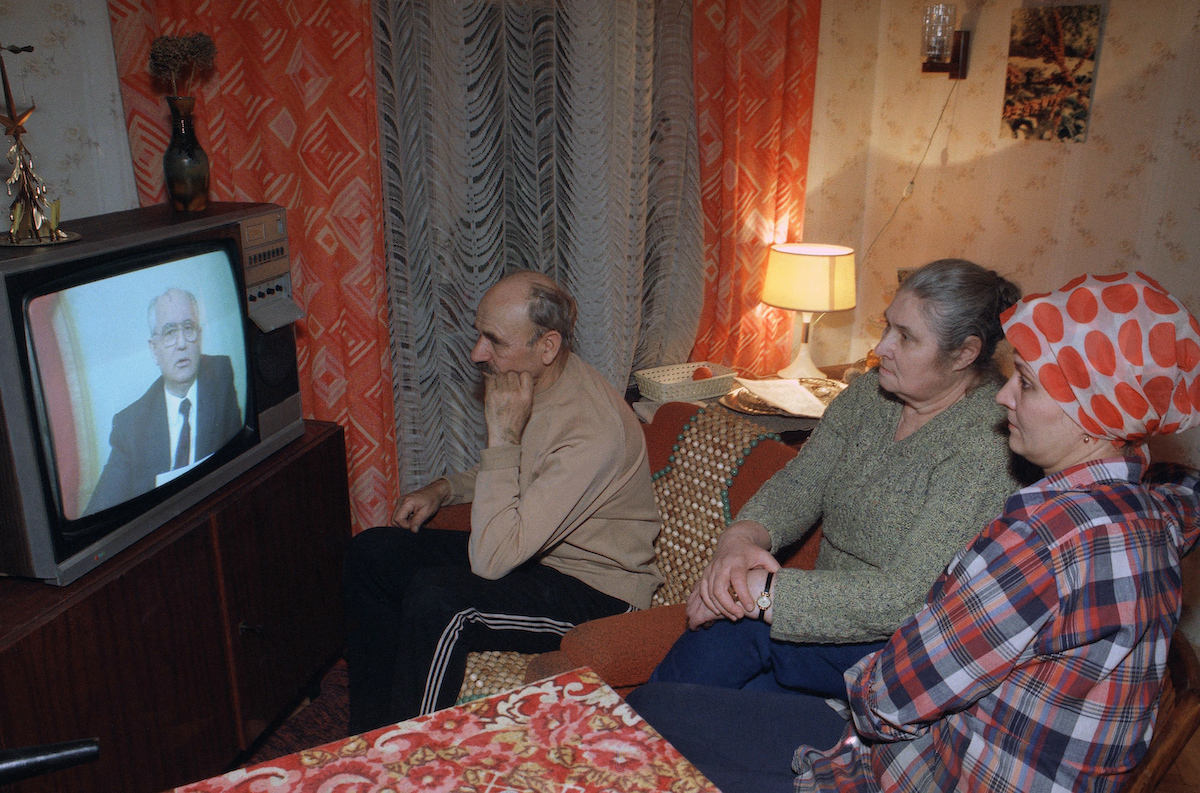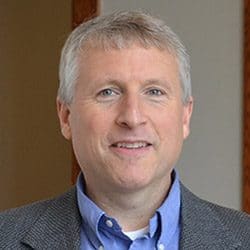“You can have a very quiet Christmas evening,” wished Soviet President Mikhail Gorbachev to American President George H. W. Bush. “I am saying good-bye and shaking your hand.”
It was a long-distance handshake, done via telephone. And it came on Christmas Day, 1991. Gorbachev told Bush he was resigning his post as leader of the Soviet Union, giving way to President Boris Yeltsin’s Russian Federation. With that, the USSR was officially over, the termination of a country that had viciously persecuted religious believers since 1917. It ended on Christmas Day in the West.
Gorbachev had been sensing this need, if not this call, perhaps a higher call, for some time, but this was the day that he (or someone higher) had ordained for the decision.
“It was no accident that during this year Gorbachev started thinking (and speaking about in his close circle) about leaving,” wrote Anatoly Chernyaev in his diary in 1990. The committed Gorbachev aide of six years, and committed atheist, then followed with this: “He [Gorbachev] sensed the mission assigned to him by God and history had been fulfilled.”
Gorbachev had seen this as God’s assignment to him? That was a revelation. And to think that it would come, in due time, on Christmas Day 1991. Very poignant.
The writing had been on the wall for some time, including the Berlin Wall. It had fallen in November 1989. By Christmas Day 1989, even Romania had broken from the shackles of a communist dictator. All of Eastern Europe had flown out of the Soviet orbit. As for the USSR itself, Lithuania was the first to declare independence, in March 1990, soon followed by Latvia. With the attempted and failed coup against Gorbachev by Soviet hardliners in August 1991, the other Soviet republics began dropping like flies. All but Russia had formally declared independence by December 1991. And that month would offer some shocking symbols of the last gasps of the USSR.
On December 8, the date of the Solemnity of the Immaculate Conception, the leaders of Russia, Belarus, and the Ukraine signed an agreement dissolving the Soviet Union and establishing the Commonwealth of Independent States. The agreement affirmed that the USSR would henceforth cease to exist as a geopolitical entity and as a subject of international law.
Then came a moment of particularly striking symbolic importance: On December 18, the Communist Party’s flag with the red hammer and sickle that had flown over the Kremlin for so many brutal decades was lowered and replaced by the flag of the Russian Federation. It was a flag of communist surrender.
The only thing still holding the Soviet Union together was Mikhail Gorbachev, clinging to his rapidly dissolving dreams of a better USSR. He held out hope, but hope was never something the USSR was about. For the final nail in the coffin, there was only one thing left to do, and Gorbachev held the hammer. He would hang on for two more weeks—until, perfectly, Christmas Day in the West: the literal birthdate of Hope Himself.
It was hard not to look upward for explanations. The events of 1989–91 seemed almost miraculous, especially given the lack not only of nuclear Armageddon but even largescale bloodshed. The Cold War ended peacefully. Two men who celebrated the feat, and looked upward for explanations, were Ronald Reagan and John Paul II.
In fact, those two men had always seen Mikhail Gorbachev as a special kind of Soviet leader. To be sure, it was often hard to understand Gorbachev. He had throughout his life, and still today, at the age of 90, insisted that his goal was to keep the USSR together. He made this clear in his December 25 resignation speech on Russian television, by noting that he had stood “firmly … for the preservation of the union state, the unity of the country. Events went a different way. The policy prevailed of dismembering this country and disuniting the state, with which I cannot agree.”
Still, to his credit, Gorbachev had sought a kinder, gentler USSR, as opposed to the totalitarian communist state. But such was never really possible. This monster needed a stake in its chest. It needed to be killed and buried. He was the instrument to make it happen.
And in this, both Reagan and John Paul II saw a Providential hand, with Gorbachev a part of that Providential purpose, even as Gorbachev’s own views on God to this day remain a mystery.
John Paul II saw Gorbachev as (in the words of George Weigel) a “providential man,” meaning an instrument of Providence. Gorbachev had felt that way ever since their historic December 1989 meeting in Rome, of which the Slavic pontiff would later say of Gorbachev: “He does not profess to be a believer, but with me I recall he spoke of the great importance of prayer and of the inner side of man’s life.” He called Gorbachev “a man of integrity.”
Ronald Reagan felt the same. What had most struck Reagan at his first meeting with Gorbachev in Geneva in November 1985 was his unexpected sense that this new leader of the atheistic Soviet state might be a believer, a “closet Christian,” as Reagan eagerly told a few aides upon his return to Washington. He shared that thought with longtime aide Mike Deaver, who responded incredulously, “Are you saying the general secretary of the Soviet Union believes in God?” Reagan replied, “I don’t know, Mike, but I honestly think he believes in a higher power.”
To this day, Gorbachev, for whatever reason, even after caught worshipping at the tomb of St. Francis in Assisi in March 2008, has refused to publicly affirm whether he believes in a higher power. For whatever reason, this is something that Mikhail Gorbachev prefers to take to the grave.
But more importantly, what did go to the grave 30 years ago this December was the USSR.
Once the communist collapse came, Russian government officials were eager to talk openly and searingly about their erstwhile empire. Now that they were free, they used the words of Ronald Reagan that were once verboten in Moscow: Andrei Kozyrev, President Boris Yeltsin’s foreign minister, was quick to explain that the USSR really had been an evil empire. It was a mistake to call it “the Union of Soviet Socialist Republics,” said Kozyrev. “It was, rather, [an] evil empire, as it was put.”
Arkady Murashev, Moscow police chief and a leader of Democratic Russia, agreed: “He called us the ‘Evil Empire.’ So why did you in the West laugh at him? It’s true!”
Sergei Tarasenko, the chief assistant to Soviet Foreign Minister Eduard Shevardnadze, summed up: “So the president said, ‘It is an evil empire!’ Okay. Well, we [were] an evil empire.”
Well, yes, it was. And now, with the close of an incredible year, 1991, that ugly atheistic empire was firmly dispatched to the ash heap of history. The graveyard of history now carried a new headstone, cold and gray and drab as the moribund Berlin Wall: December 25, 1991.
All that brings us to where we are now with Russia. Life in today’s Russia under Vladimir Putin, a former KGB lieutenant who has been in power since 2000, is unquestionably freer and better than under the old USSR. But it is certainly far from perfect.
I often think back to a prophetic interview I did with the late Richard Pipes in September 2005. The acclaimed Russia historian and Harvard professor of Sovietology, who served in Reagan’s National Security Council in 1981 and 1982, visited Grove City College that month. I was optimistic about Russia, but Putin’s moves of late were concerning to both of us. What Pipes said strikes me to this day for how prophetic it was. Said Pipes:
I had high hopes that after the dissolution of the communist regime, Russia would take the path of democracy—imperfect but a democratic path nonetheless. Instead, they went right back to autocracy. I have no hopes now. There is a move right now in the parliament to amend the constitution to allow Putin to stay in office beyond his two-term limit. Russia 10 to 20 years from now will be a kind of a mild dictatorship. If Russians elect their leaders, they will likely do so in skewed elections.
That is precisely what has happened under Putin. Pipes hastened to add that, “Of course, Russia today is certainly better than it was under the communist regime. People can travel abroad, can read foreign publications, can listen to foreign broadcasts. But it is not a democracy. It’s not what we hoped for. It’s an autocracy. Not a tyranny. Not a totalitarian regime. An autocracy. Communism, if not dead, is dying. Nationalism, however, is not dead, and autocracy is not dead. They’re going back to the 19th century. It is a very discouraging picture.”
As for the economic system, Pipes characterized it as “a kind of half-baked capitalism” in which “the government is encroaching on the private sector”: “It appropriates things very easily and it threatens people who have money with all kinds of punishments if they meddle in politics. So the economic system is a kind of bastard capitalism, not genuine capitalism.”
Pipes summed up the political system evolving under Putin as a “quasi-democracy.” He predicted: “According to the Russian constitution, the president can only serve two terms, but there is already talk in the Duma [the Parliament] that he should be begged to run for a third term, that it is undemocratic to deny the people the right to vote for a man they want just because he has served two terms. Putin repeatedly says that he will not run for a third term, but I would not bet on that.”
Precisely that had come about by 2012.
Many cultural conservatives in the United States and West are eager to defend Vladimir Putin for affirming traditional Christian values on subjects from abortion to marriage. Very soon after coming to power, he placed the first restrictions on rampant abortion in the country in over a half century. He wants “momma and poppa” for every Russian child—that is, he wants two-parent families, a mother and a father. He has even implemented a national fertility day to encourage Russians to have children. He has cut taxes. In his first year in office, he immediately implemented a 13% flat tax on all Russian incomes.
And yet, Putin and his regime’s alarming list of abuses, on everything from journalistic freedom and skewed elections to once again eyeing up chunks of the Ukraine, not to mention finding a way to keep himself in power for more than 20 years despite constitutional term limits, are very discouraging.
I heard a libertarian friend on a radio show in February 2014, when Putin was moving against the Ukraine over Crimea. My friend lamented the aggressive development and told the host, “The problem here is freedom. What Russia needs is more freedom.”
Really? More “freedom” would keep Vladimir Putin from biting off the Ukraine? Would it also stop him from persecuting journalists and securing himself more terms in power? The reality is that Russia’s trajectory since December 1991 has been one of consistently increasing freedom. But that’s no panacea.
What the experience of modern Russia has shown is what the likes of John Paul II, Aleksandr Solzhenitsyn, and also Fr. Robert Sirico of the Acton Institute warned about from the outset, namely: More freedom does not necessarily equate to more virtue. A successful society needs faith as well as freedom. Faith brings virtue.
Our recent popes, from John Paul II and Benedict XVI to even Francis, have all warned about the dangers of an “idolatry of freedom.” Freedom alone doesn’t bring you the promised land. Freedom needs virtue. Russia’s experiences since 1991 have made that perfectly clear.

